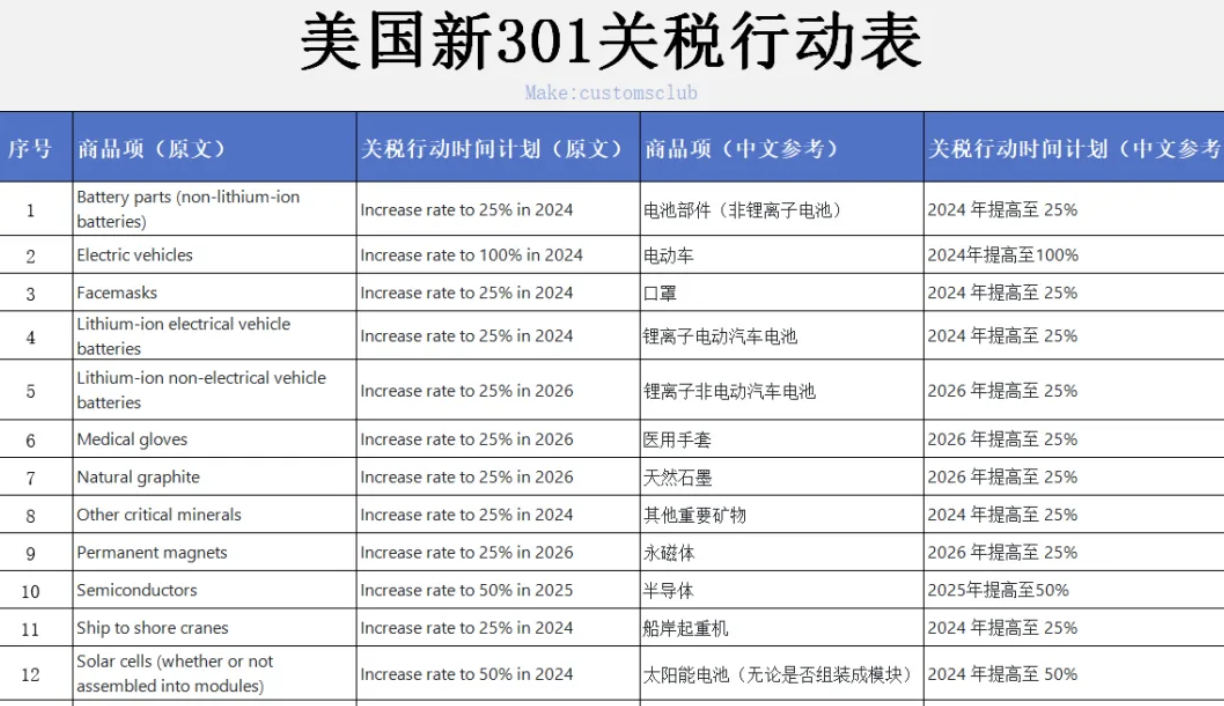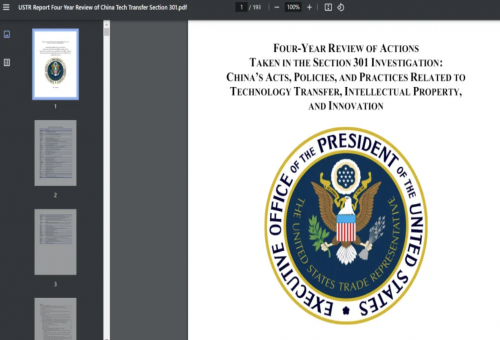美国宣布对华14类商品加征301关税,电动车关税最高加征100%
美国时间2024年5月14日,美国贸易代表办公室(USTR)发布301调查四周年审查报告,并发表对中国301关税行动发表声明。美国贸易代表戴琪表示:对中国301关税的四周年审查报告考虑了她的建议,拜登总统指示其采取进一步行动,对某些产品增加或提高关税(如下表,具体相关商品编码后续继续跟进)。

.png)
https://ustr.gov/sites/default/files/USTR%20Report%20Four%20Year%20Review%20of%20China%20Tech%20Transfer%20Section%20301.pdf
The Report also makes recommendations for: (1) establishing an exclusion process targeting machinery used in domestic manufacturing, including proposals for 19 exclusions for certain solar manufacturing equipment; (2) allocating additional funds to United States Customs and Border Protection for greater enforcement of Section 301 actions; (3) greater collaboration and cooperation between private companies and government authorities to combat state-sponsored technology theft; and (4) continuing to assess approaches to support diversification of supply chains to enhance our own supply chain resilience.
President Biden is also directing Ambassador Tai to establish an exclusion process for machinery used in domestic manufacturing and to prioritize, in particular, exclusions for certain solar manufacturing equipment.
Next week, USTR will issue a Federal Register notice announcing procedures for interested persons to comment on the proposed modifications and information concerning an exclusion process for machinery used in domestic manufacturing.
中译参考:
报告还提出了以下建议 (1)建立针对国内制造业所用机械的排除程序,包括对某些太阳能制造设备的19项排除建议;(2)为美国海关和边境保护局增拨资金,以加大301条款行动的执行力度;(3)加强私营公司与政府当局之间的协作与合作,以打击国家支持的行为;以及(4)继续评估支持供应链多样化的方法,以提高我们自身供应链的复原力。
拜登总统还指示戴大使建立国内制造业所用机械的排除程序,特别是优先排除某些太阳能制造设备。
下周,美国贸易代表署将发布联邦公报,公布有关人士就国内制造业所用机械的拟议修改和排除程序信息发表意见的程序。
Background
In May 2022, USTR commenced the statutory four-year review process by notifying representatives of domestic industries that benefit from the tariff actions of the possible termination of those actions and of the opportunity for the representatives to request continuation. In September 2022, USTR announced that because requests for continuation were received, the tariff actions had not terminated and USTR would conduct a review of the tariff actions. USTR opened a docket on November 15, 2022, for interested persons to submit comments with respect to a number of considerations concerning the review. USTR received nearly 1,500 comments.
As part of the statutory review process, throughout 2023 and early 2024, USTR and the Section 301 Committee (a staff-level body of the USTR-led, interagency Trade Policy Staff Committee) held numerous meetings with agency experts concerning the review and the comments received.
Specifically, the Report concludes:
-
The Section 301 actions have been effective in encouraging the PRC to take steps toward eliminating some of its technology transfer-related acts, policies, and practices and have reduced some of the exposure of U.S. persons and businesses to these technology transfer-related acts, policies, and practices.
-
The PRC has not eliminated many of its technology transfer-related acts, policies, and practices, which continue to impose a burden or restriction on U.S. commerce. Instead of pursuing fundamental reform, the PRC has persisted, and in some cases become aggressive, including through cyber intrusions and cybertheft, in its attempts to acquire and absorb foreign technology, which further burden or restrict U.S. commerce.
-
Economic analyses generally find that tariffs (particularly PRC retaliation) have had small negative effects on U.S. aggregate economic welfare, positive impacts on U.S. production in the 10 sectors most directly affected by the tariffs, and minimal impacts on economy-wide prices and employment.
-
Negative effects on the United States are particularly associated with retaliatory tariffs that the PRC has applied to U.S. exports.
-
Critically, these analyses examine the tariff actions as isolated policy measures without reference to the policy landscape that may be reinforcing or undermining the effects of the tariffs.
-
Economic analyses, including the principal U.S. Government analysis published by the U.S. International Trade Commission, generally find that the Section 301 tariffs have contributed to reducing U.S. imports of goods from the PRC and increasing imports from alternate sources, including U.S. allies and partners, thereby potentially supporting U.S. supply chain diversification and resilience.
-
背景情况
2022 年 5 月,美国贸易代表署启动了为期四年的法定审查程序,通知受益于关税行动的国内产业代表这些行动可能终止,以及代表们有机会要求继续执行。2022 年 9 月,美国贸易代表办公室宣布,由于收到了继续要求,关税行动并未终止,美国贸易代表办公室将对关税行动进行审查。美国贸易代表办公室于2022年11月15日设立了一个备审案件,供有关人士就审查的一些考虑因素提交评论意见。美国贸易代表署收到了近 1,500 份意见。
作为法定审查程序的一部分,在整个 2023 年和 2024 年初,美国贸易代表办公室和 301 条款委员会(美国贸易代表办公室领导的机构间贸易政策参谋委员会的参谋级机构)与机构专家就审查和收到的意见举行了多次会议。
具体而言,报告得出以下结论
301 条款行动有效地鼓励了中华人民共和国采取措施消除一些与技术转让相关的行为、政策和做法,并减少了美国个人和企业受这些与技术转让相关的行为、政策和做法影响的程度。
经济分析普遍认为,关税(尤其是中国的报复)对美国总体经济福利的负面影响较小,对受关税影响最直接的 10 个行业的美国生产有积极影响,对整个经济的价格和就业影响很小。
对美国的负面影响尤其与中国对美国出口产品征收的报复性关税有关。
至关重要的是,这些分析将关税行动作为孤立的政策措施来研究,而没有提及可能加强或削弱关税影响的政策环境。
包括美国国际贸易委员会发布的主要美国政府分析在内的经济分析普遍认为,301 条款关税有助于减少美国从中国进口商品,增加从其他来源(包括美国盟友和合作伙伴)的进口,从而可能支持美国供应链的多样化和弹性。



